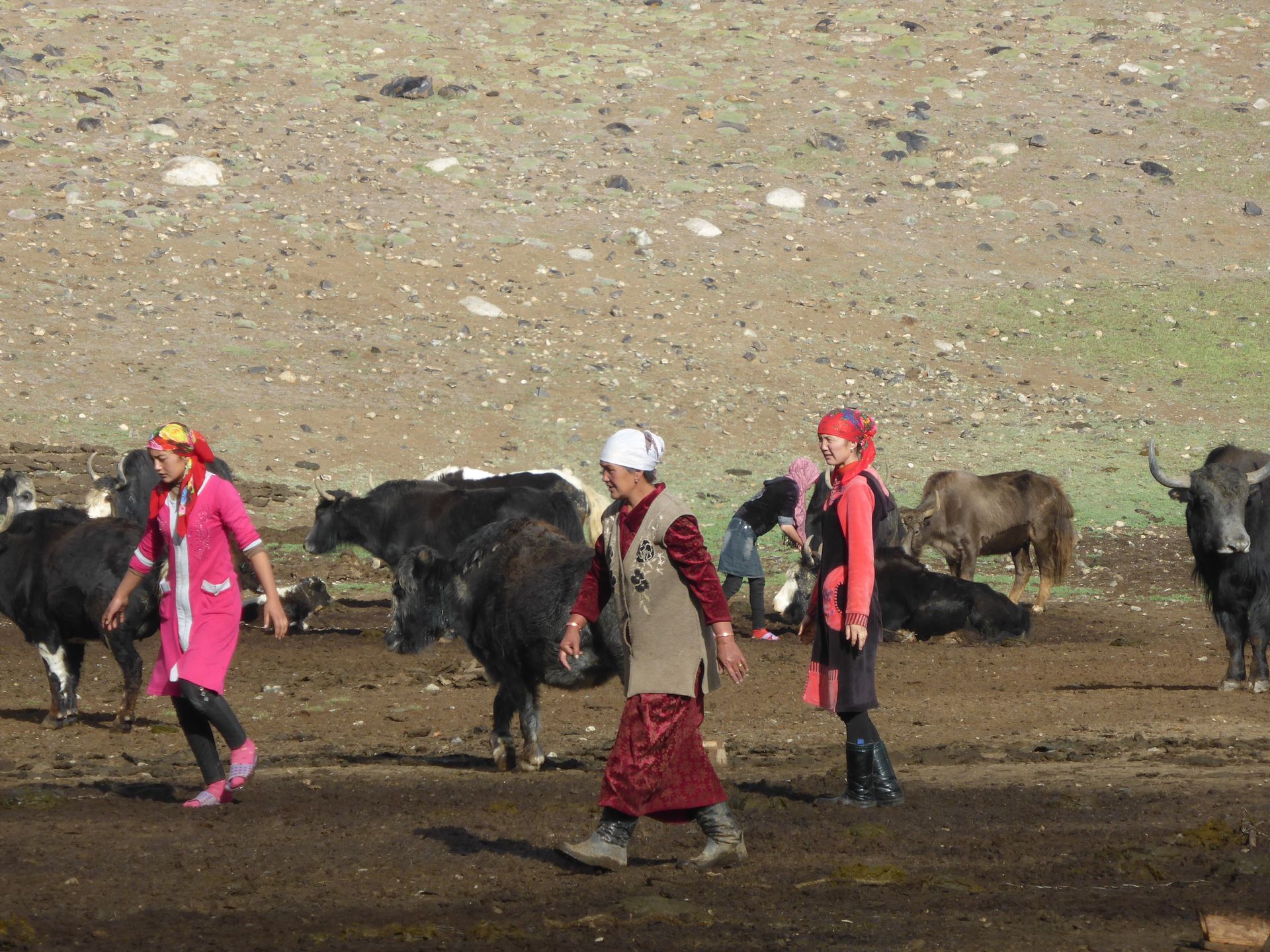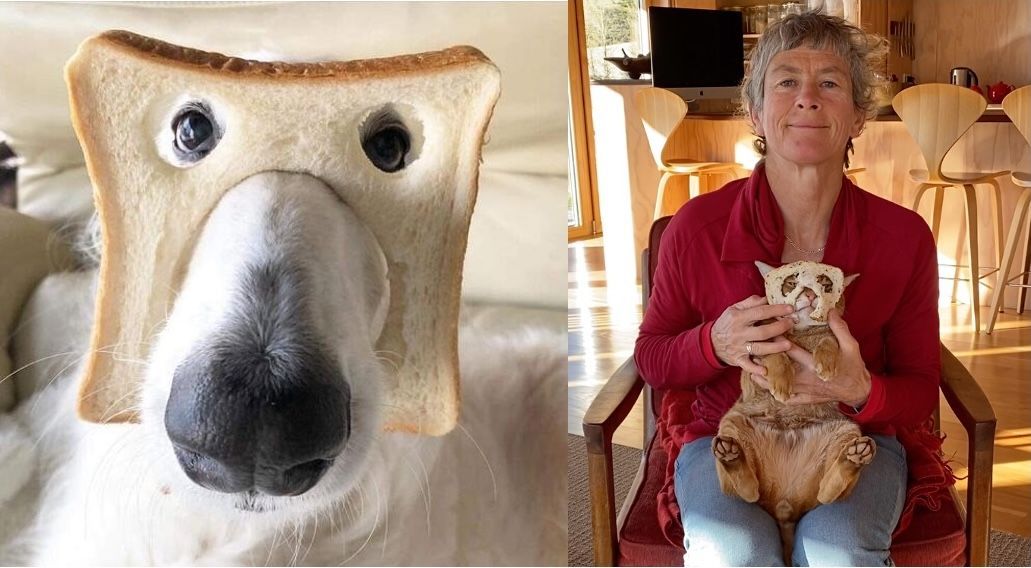Depths of Dankai Part 2
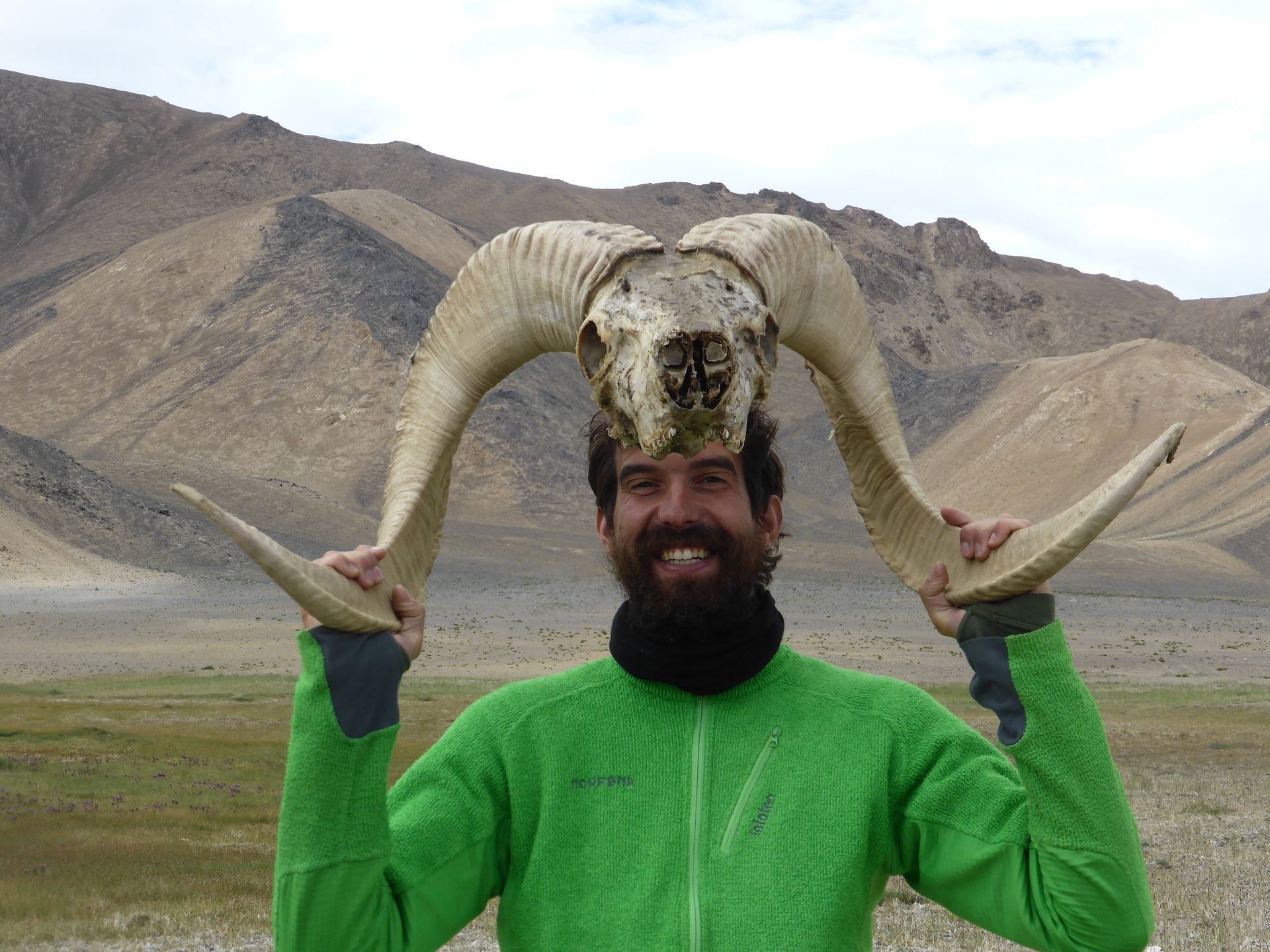
Following on from last week, we're in the middle of the Tajikistan Pamir mountains, finding a route around the west side of Lake Karakul. We're about to turn off the highway which, however potholed, is a certain route to the Tajik-Kyrgyz border.
***
The morning after our wind-swept camp, we wave goodbye to our short term friends and veer northwest under grey scudding clouds onto a gravelled four-wheel-drive road. If anyone had asked, I wouldn't have admitted to the vague sense of trepidation twisting my stomach. How difficult will the route be? Could we get lost? Are we carrying enough food?
My internal commentary countered, You can always cycle back the way you've come.
Yes, but we might be hungry.
As we pedal forward, the distant highway disappears into the stony plain and the valley fills with a tapestry of river channels intersecting wetlands. We rest at a weatherworn map board of the National Park of Tajikistan and try to make sense of it. A green blob outlines the Karakol Nature Park boundaries and a black line marks the Pamir Highway. The north of the park to which we are headed, has a few place names in black, including 'Jingajir', and some mountain peaks labelled in red. The map has no north arrow, scale, or 'you are here' marker.
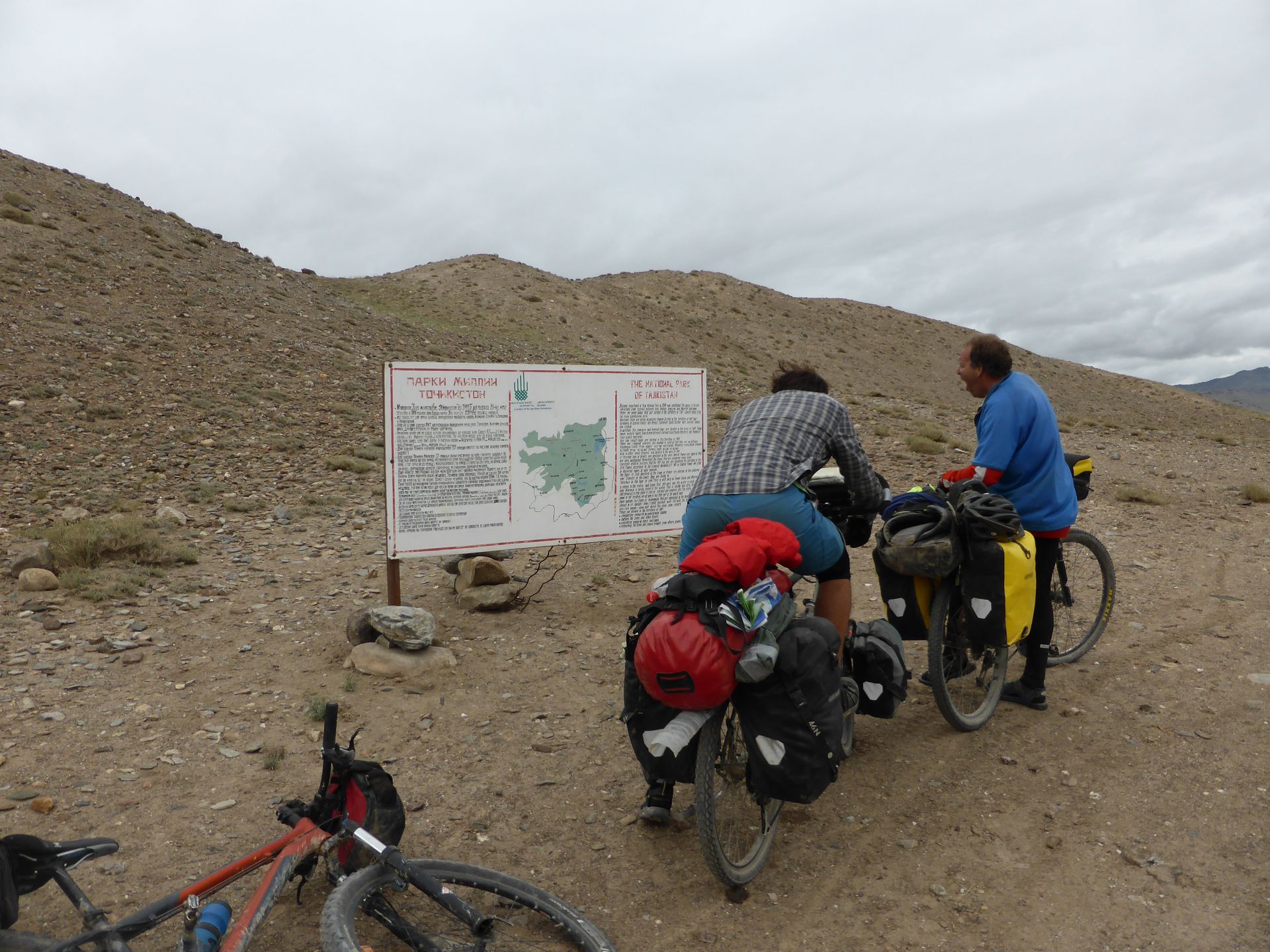
Surprisingly, there is large block of English text down the side informing us the park holds fifty-seven thousand types of plants and thirty-three types of mammals, including rare snow bears, Marco Polo sheep and snow leopards. It would be cool to see a snow leopard. At the bottom is a list of prohibitions, including 'uniffective usage of flora and fauna'.
After another hour of cycling, the track peters out into gravel, then swampland dotted with purple and yellow flowers. We are shoving our bicycles effortfully forward, mud squelching around our feet, and a thunderstorm is building behind us. Are we lost? We struggle upslope to find another gravelled track (or have we refound our original route?) which leads to a squat cluster of buildings painted with splotches of pink on cream. We lean our bikes on the wall of the largest building and knock on the door, hoping for shelter from the storm which is closing in.
Three muscular men dressed in camouflage jackets and grey trackpants fill the doorway and corridor. Should we be worried?
"Salom!" we say.
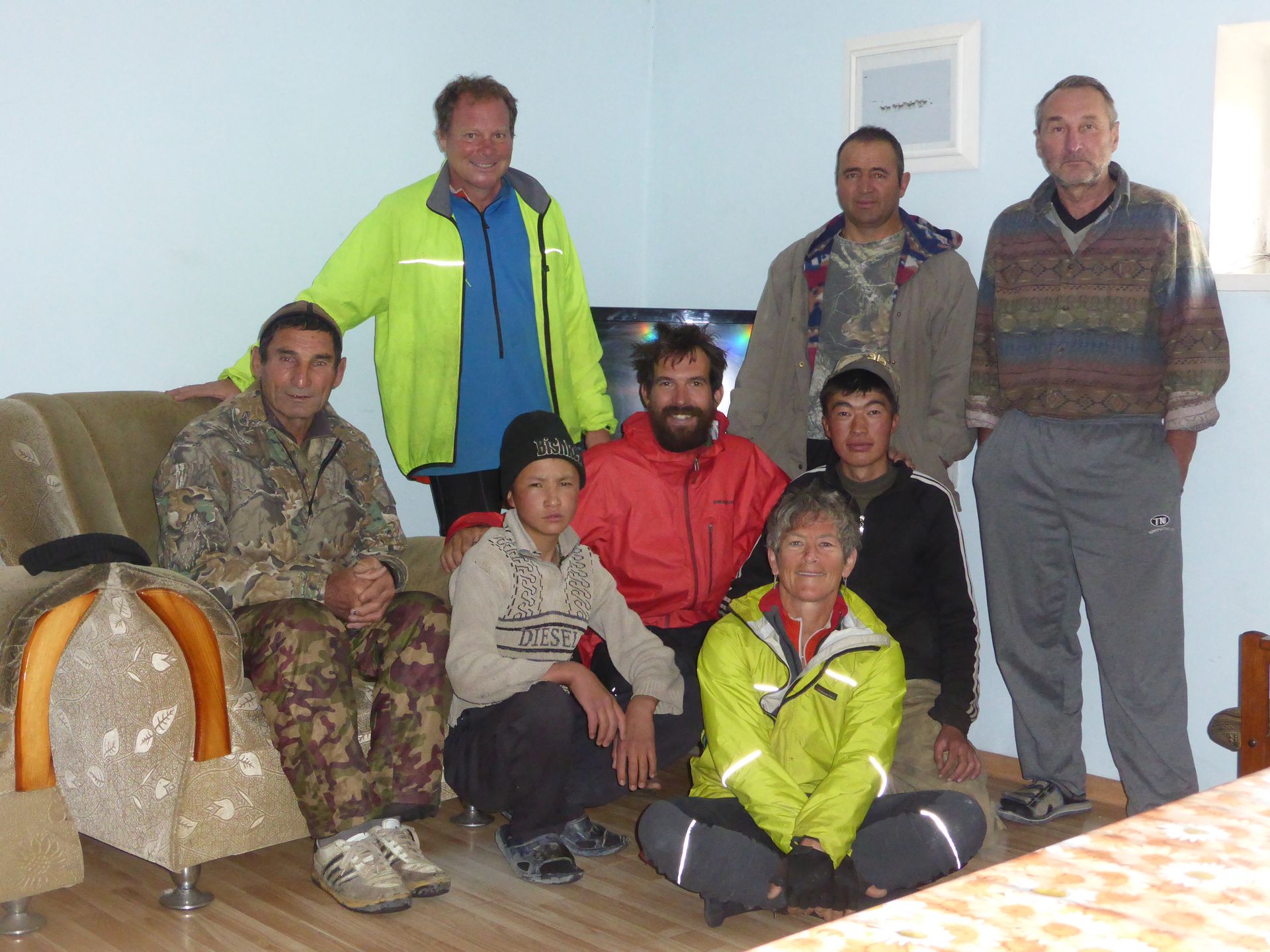
We are ushered in and the tallest man points to each of them in turn, "Yuga, Kasim, Eddik." Two boys appear from a back room and we all go into a kitchen where they put a kettle on the stove. Using sign language, their few words of English, and Michael's Russian dictionary, we learn this is the Jingajir hunting camp and they are getting ready for the Marco Polo sheep hunting season in a couple of weeks. The trio of men guide hunters to find trophy sheep – Marco Polo horns can span nearly 1.5m and weigh twenty kilograms and people pay tens of thousands of dollars to shoot them. How can the sheep hold their heads up with horns that big?
Visitors other than hunters are unusual and the hunting crew are happy for some entertainment beyond each other. They cook us a feast of potatoes and cheese – much better than our Chinese packet noodle dinners – and we sleep in style on our blow-up mats in a dusty windowless room. Windowless rooms are premium where only some windows are glazed.
In the morning we eat porridge with the men and do our best to look calm and capable as they suggest we should return to the Pamir Highway. "Wolves," they say, with solemn faces. It was the same when we cycled in Xinjiang, China – locals warned us we might be eaten by wolves in the high plateau. In China, the main problem was the wind and freezing rain. It's not so dissimilar in Tajikistan; we decide to take our chances with the wolves while wishing for a shift in the resolutely grey and windy weather.
We cycle up the Jingajir river into a chill wind blowing beneath lowering clouds. Icy river water soaks our feet as we repeatedly cross the river, sometimes ankle-deep, sometimes calf-deep. The vehicle track meanders up the grassy valley, sometimes disintegrating into a stream, then a wheel-rutted mud pit. Slick clay coats our tyres so thickly they jam against the bike frames. We pull out our camping spoons to scrape at gluey sludge until their handles bend, then hunt unsuccessfully for sticks.
Searching for warmth as another squall blows through, we cross a slippery, sloping bridge above a fast-flowing stream to a cluster of herder's shelters where we stamp our feet in the lee of a mud-brick wall. We eat some of our precious supply of chocolate-covered peanuts bought in Murghab four days ago. We should boil up some water for a hot drink. Except our stove is on my bike on the far side of the plank – not crossing that more than once again. I shiver in my damp jacket.
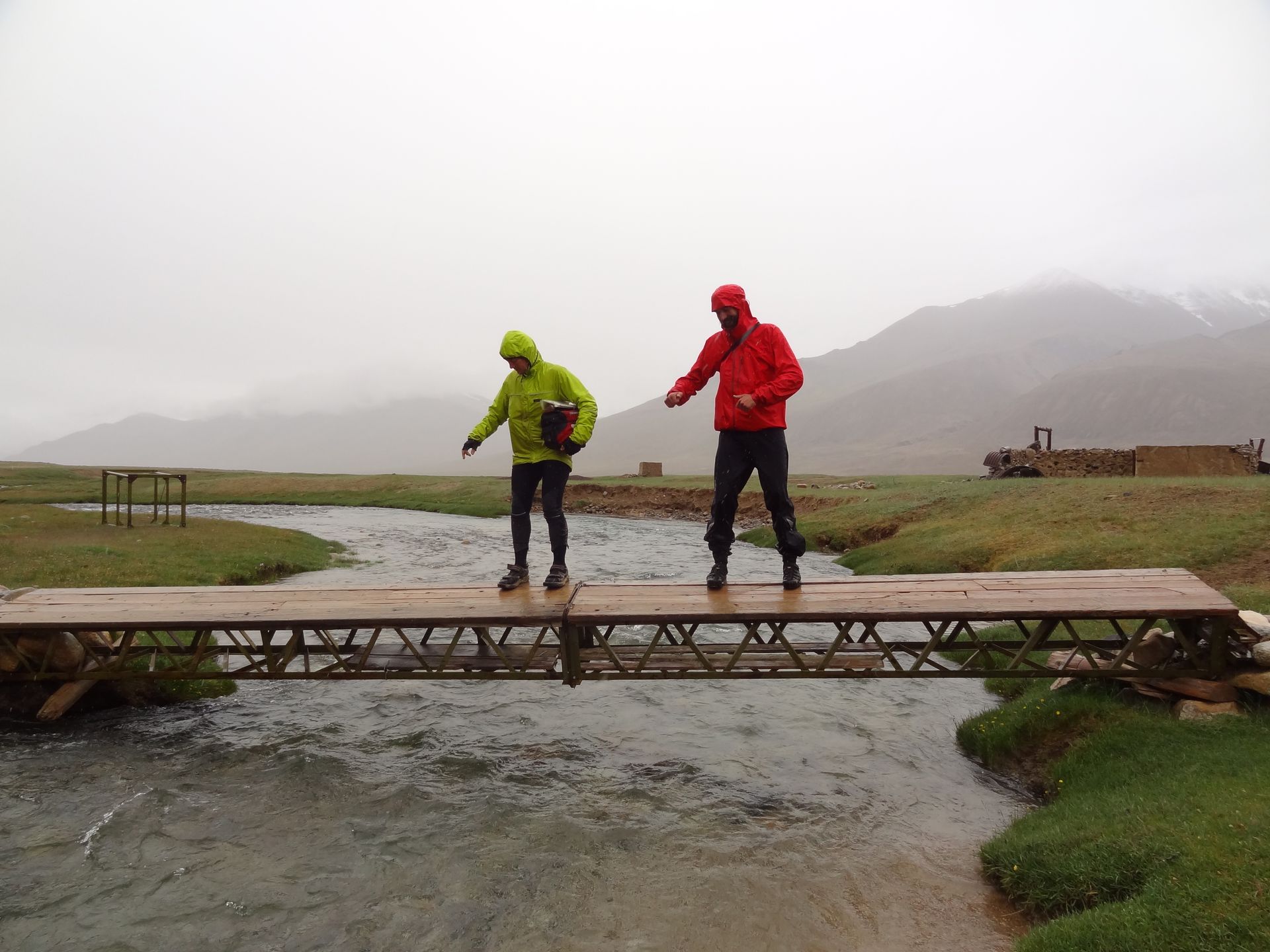
After four hours of our floundering, the Jingajir River splits and we take the northern branch, straight towards Karachym Pass. Dark brown and white yak herds graze the green valley floor and we glimpse freshly snow-dusted peaks above barren grey-brown mountainsides as the clouds lift. Ahead is an encampment with two mud-brick buildings and a yurt, all with smoke puffing from their chimneys. A turquoise-green jeep is parked outside. We cycle over a rickety wooden bridge and I summon up a grin as Chris takes my picture while watched by a small boy holding a toy wooden rifle. More children run ahead of us towards the buildings and, when we get to the open door, we are welcomed by two women.
We share stale bread and hot tea with the women – the normal offering in the Pamir, where every visitor is brought inside because shelter is lifesaving in a high valley between even higher peaks, and where the weather changes by the minute. Stale bread is the norm because fresh bread days are fortnightly, at best. There are no trees for fuel in the barren landscape; yak dung painstakingly gathered and dried on roofs during the short summers to fire earthenware bread stoves every couple of weeks.
After tea, our bikes need attention. Children in caps, jackets too large and too small, gumboots and holey running shoes, crowd around us as Chris struggles with his Old Man Mountain rack which refuses to stay straight on his bike frame. Our aluminium racks are literally folding under the weight of our panniers – we had little idea of what was in store when we cycled out of Dushanbe. Our yellow, waterproof Ortleib panniers are packed to the extent of the straps and we have four days of food in a pack on top of our racks, far exceeding their 30kg load capacity.
The children are fascinated by our gear and want to help, or play with the tools. Chris, in his normal fashion, offers our Leatherman multitool to a child while I try to keep track of our possessions scattered where Chris dropped them while searching for the right tool. Why did you do that? We have no spare tools.
When we repack our repair kit, the Leatherman is nowhere to be seen. I sigh with exasperation. We mime and gesticulate – "Where is the Leatherman?" Children shrug, screw up their faces and look at each other. I take the quest to the next level and try to explain the problem to one of the women. She calls one of the larger boys over – hey presto, the Leatherman appears in a hand. Order is restored…until Michael checks his front pannier and finds his Victorinox multi-tool is missing.
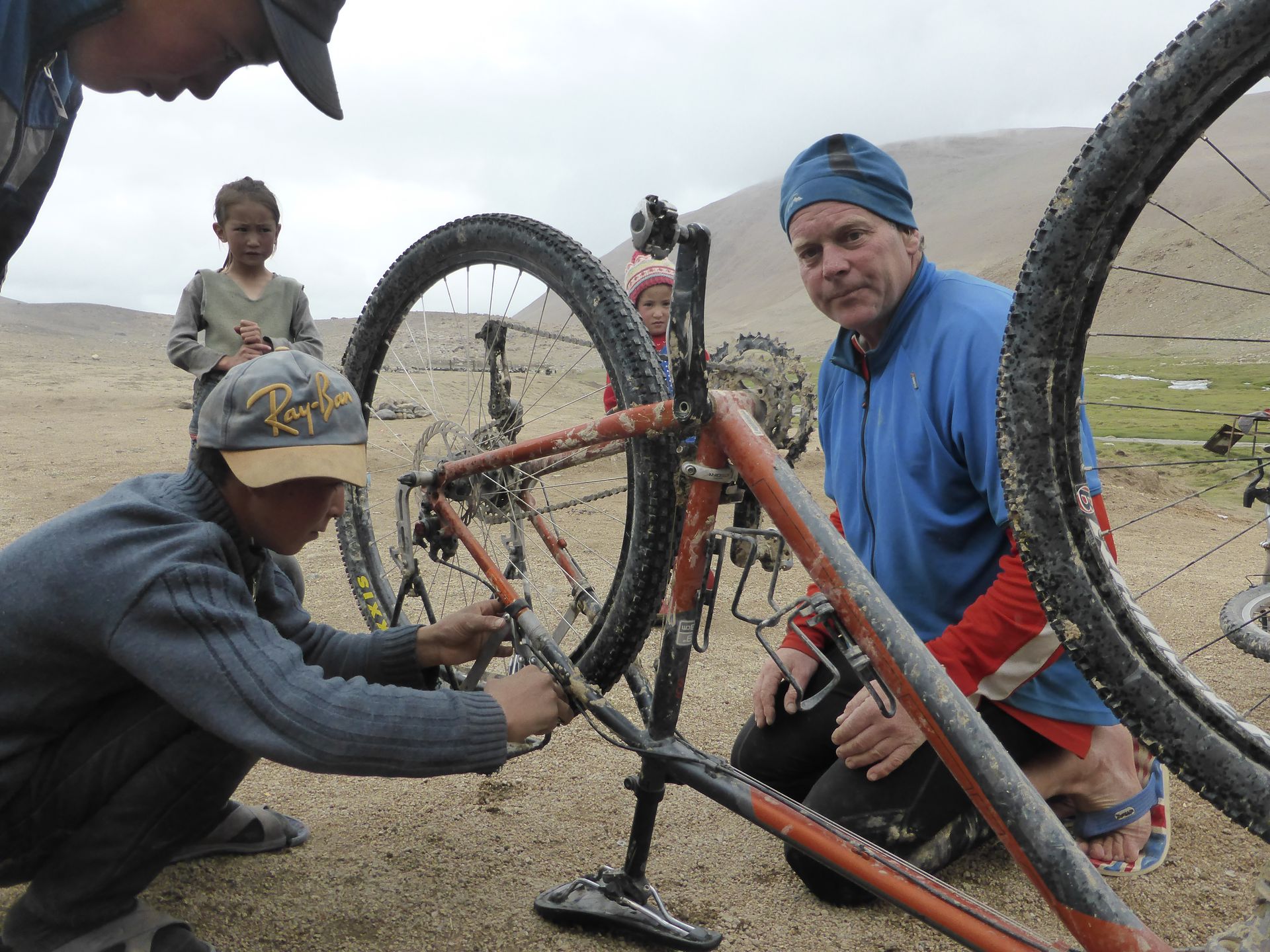
Another search commences. Children run around the buildings, whether chasing each other or the knife isn't clear. We grumble to each other. The women speak sharply to the children. I walk around the corner of the main house to see a boy tossing an object onto the roof. Chris boosts Michael up ; the parapet edging breaks off in his hand as he climbs onto the slope. Michael scans the roof and finds his multi-tool, then climbs down as we look at the broken edge. "They stole my knife," he says. We return to our bikes and show the knife to the children; more shrugs. How could the knife have got on the roof?
While repairing our bikes, we'd discussed asking to stay the night here. However, this theft – the first and only in our two months cycling across Tajikstan and Kyrgystan – is offputting. We swing our legs over our saddles, don't even notice the rickety bridge, and cycle dourly up the valley in which rain is again falling.
Another hour of alternating cycling and pushing brings us to the next and smaller yak-herding camp, labelled Jia Lo on Michael's Soviet map. A collapsed yurt slumps on the roof of the single building, whose window covering is taped-together plastic strips. We are welcomed in through the faded green wooden door to join a man, woman, two teenage girls and a younger boy in a room smelling of smoke and salt.
We sit cross-legged (or straight-legged in Chris's case given his lack of flexibility) on layers of wine and mustard and cream synthetic blankets with patterns of roses and sunflowers. Our female host offers us mugs of green tea together with plates of sheep's head soup ladeled from a pot on the yak dung stove. We know we're drinking sheep's head soup because bulbous sheep eyes stare at us from the skull partially covered with simmering liquid. Does the scraggly pregnant sheep tethered next to the stove recognise what's cooking?
After dinner, we try asking about Dankai. Michael pulls his phone out, we provide the chicken map and we all point and mime. Our male host, with a lean face, dark brown eyes and a blue wool cap over sparse hair, looks at Michael's phone with incomprehension. He takes the chicken map and turns it around, squinting – I realise he can't see the markings.
"Chris, where are your reading glasses?"
Chris rummages through his front pannier then hands his reading glasses over. Chris finally bought reading glasses for this trip after I threw multiple tantrums about having to do all the map reading and him never having a clue where he was because presbyopia meant he couldn't see the detail on maps. Unfortunately, these glasses have already lost an arm because Chris fell asleep with them on, then broke the hinge when he rolled over. Our host puts Chris's glasses on, looks at the phone, and his face lights up. He focuses on the screen then pulls his hand across at waist level. Michael, Chris and I exchange glances. This is better than the scenario painted by the Jingajir hunters, although waist deep is sufficiently scary with a bike. Nothing we can do right now, except go to bed. We'll make a call after we've slept on it.
In the morning, we eat stale bread mashed up in salty black tea with yak milk – yak herder porridge and their sole daytime meal. No wonder yak herders are thin. The teenage girls are beautiful with bright bandannas pulling back their long, straight, black hair. They wear bright red and pink robes over black leggings. One has stylish black boots and the other plastic sandals over pink socks. How can they be so clean and tidy, given the only running water is in the glacial stream and they are chasing yaks around muddy paddocks? I look at Chris in comparison – his hair is standing on end and he's unshaven. Michael is avoiding the shaving issue by growing a bushy beard.
"Are we going on?" I ask, as we slowly pack our bags.
"Might as well try," Chris says. "We've come this far."
"We can always turn back at the pass," Michael replies. "It'll be all downhill on the way back."
As we prepare to say goodbye, Chris says to me, "I suppose I should give him [our host] my reading glasses."
"Obviously," I say. "Look at the difference the glasses made."
"Do you think I can give him the one-armed glasses?" Chris asks.
"When do you think he's next going to the glasses shop?" I reply. "You'd better give him your spares."
Chris hands over his pair of two-armed glasses and our host beams. Chris will have to spend the remainder of our trip holding his one-armed glasses against his head while reading, so he doesn't feel seasick. We wave, shout "Khayr," (goodbye) as we cycle uphill, stopping to take pictures of the family amongst their yaks, then the distant settlement. Rays of sun are glinting between the clouds; I take it as a good omen.
Next episode next week...
